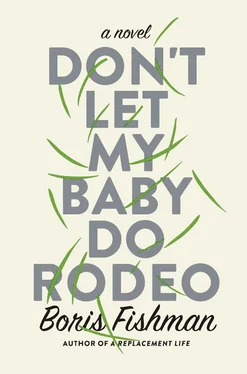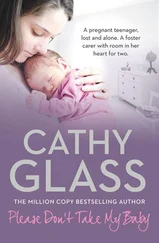Max giggled. “Why did you do that?”
“I don’t know, honey. But it was fun. You shouldn’t do it with any of our glasses, please. If you want to do it, please tell me — and we’ll do it together. Because you’re just eight years old. My mama wouldn’t let me anywhere by myself for another four years. Do you understand? She would have been so upset if I went off on my own. We can do so much — but together. I like so much being with you. Don’t you like it, too?”
Max thought, and, as if truly deciding, nodded.
“When we were done — ten glasses, each of us — my mama went and got a broom from one of the men. They laughed into their mustaches. She swept up the whole mess, put it in one of the trash bins, and we left. But when we came back the next year, she brought two boxes and she gave one to them.”
Max seemed to be thinking about the story. She sat on the floor next to the bed, watching him.
“Did you ever run away?” Max said.
“No,” she said. “But when I was twelve, my mama sent me to my uncle’s for a summer. I really didn’t want to go. I wanted to be with her.”
“Did Papa ever run away?” Max said.
“Not exactly. He was playing in the sandbox with a friend once and two men came up to ask for directions to his school. And he volunteered to take them. He walked them all the way. He was lucky because Grandpa Eugene came outside just in time and asked his friend where Papa was. And his friend said. And Grandpa Eugene raced to the school. And he got there just in time.”
“Just in time for what?”
“Just in time for nothing bad to have happened to your father. He was little and he wanted to be nice, but he made a bad decision. When you’re little, even if you feel like doing something — even if it’s nice — you have to tell your mama and papa. And then it’s okay.”
Max considered this information. Maya bent toward her son. “Can I ask you something now?”
He nodded and busied himself with an edge of the blanket, turning it this way and that.
“Were you scared today?” she said. “Was it ever scary?” What she wanted to ask was Did you worry you wouldn’t come back to us? But she couldn’t bring herself to ask that.
Max shrugged. “A little,” he said finally.
They said I love you and touched nose tips — how they said good night. Maya watched Max close his eyes, as if to reassure herself that, indeed, she had not disrupted his sleep lastingly. She took the steps downstairs, where, upon her entry to the kitchen, the conversation stilled.
“How is he?” Alex said.
“He’s okay now,” Maya said thickly. “He needs to see a doctor.”
“A doctor?” Alex said.
“He doesn’t understand if there’s something wrong — and why would he,” she said. “There’s a pediatric psychiatrist at the hospital. A wonderful man, Saltz. They know him around the country.”
“And tell him what?” Alex said. “Our son runs off to sit in a river? Take him, take him. He’ll tell you that Max suffers from psychotic episodes, multi-personality disorder, whatever you like. He’ll put him on — I don’t know what it’s called, but you know what I’m talking about. Those pills. And then you’ll see what fucked-up really means. Your child will never be the same.”
“Sasha!” Raisa said. “If you want to use foul language, please wait till I leave.”
You never leave, Maya nearly said, but silenced herself just in time. Alex held up a hand in apology.
“I’m afraid to leave things as they are,” Maya said. “If not Saltz, we should take him to a psychologist.”
“He can look in a crystal ball to see if Max will ever sleep in a regular bed again,” Eugene said.
“You keep saying we got a bad deal, Eugene,” Maya said. “Should we do something about it or not?” She got out the words, but her appetite for altercation had drifted away.
“So, you want ours to be the family with the boy with the”—Eugene twirled a finger into his temple in a Soviet gesture that meant: not all there.
“I spoke to him very directly,” Raisa said. “I think things are going to be very different now.”
“A psychologist?” Alex said. “And pay two hundred dollars for forty-five minutes? You’re overreacting, Maya. Do you know that expression: ‘There are no healthy people, only the undiagnosed’? You go to the doctor, the doctor will find something wrong with you. How else can they make a living?”
“What about Bender?” Raisa said. “Bender might see him for free.”
“Bender in Whippany?” Eugene said, incredulous. “Our Bender?” He meant that Bender was Russian.
“You like to find problems in others’ proposals,” Alex said to his father, “but you have none of your own.”
“Boys, please,” Raisa pleaded.
“I am so tired,” Maya said.
“Go to bed, darling,” Raisa said magnanimously.
Maya obeyed. Sometimes, she was grateful for Raisa’s mother-like agitation. She mounted the stairs once more, her thighs sore as if she had pedaled and pedaled somewhere, and sat down carefully on the edge of the bed she shared with Alex. She watched the bedside telephone for a long time and finally lifted it, expecting it to feel unbearably dense in her hand. She listened to the dial tone long enough that it failed and the impatient beeping began. She clicked off and on and dialed Nina Benton, the woman on whose property Max had lowered his head inside a creek. The line rang and rang and she was about to give up when finally the receiver clicked and a distracted voice said hello. Maya checked the clock and felt guilty. It was a farm of some kind; surely they rose early. She apologized and quickly gave her name. The voice on the other end asked her to hold it, and then Maya heard threats about tooth-brushing, stories, and bedtime.
“I imagine the kind of night you’re having,” the voice came back, now more careful and allied.
“I’m sorry to bother you,” Maya said.
“We’re glad he’s fine,” she said. “It’s the most important.”
Maya asked for detail beyond what Alex had told her, but there was nothing.
“He said you have boys of your own,” Maya said, deflated but not wishing to let go.
“Three,” Nina Benton said.
“A handful,” Maya said enviously.
“Handful because each is disabled.”
“Oh,” Maya said. “I’m sorry.”
“Don’t be,” the voice said. “They’re great boys.”
Maya apologized again. Apparently, she had made her husband’s view on handicaps also her own.
“I’m so scared,” she blurted out. Then she apologized a third time. “I’m sorry. I know you can’t help me.”
“Now listen to me,” Nina Benton said. “I’m putting you off only because I have to get these boys into bed. We break routine, and all hell goes loose. But you can talk to me. You can call me tomorrow. You want to come here in the afternoon and have coffee, I’ll make time.”
“Thank you,” Maya whispered. “I can’t drive.” It sounded like a disability of her own. She said another thanks and hung up. She felt envy for the happy bedlam on the other end of the line. Still wearing her clothes, she went down on the bed and collapsed into a deep, hopeless slumber, the soft rumble of the others talking below her. Her final thought was a thanks that the affliction she felt made her want to sleep instead of unable to.
+
His mother having turned to the dishes in the sink and his father to the newspaper that had gone untouched because of Max, Alex left the kitchen and took the stairs toward his son’s bedroom. The door creaked slightly when he opened it, and he reminded himself again to oil the hinges. His son — Alex felt encouragement and surprise — was in bed; Alex had kept his skepticism to himself when Raisa had declared, on her return to the kitchen, that the boy had been set up there. (She had paused shyly to give the others a chance to admire her achievement; through the affection only a grandmother could give she had managed to solve the problem.)
Читать дальше












